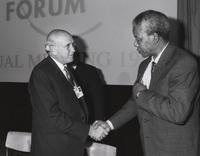-
Rep. Rogers, House Intelligence chair: Russian intelligence may have helped Snowden

Representative Mike Rogers (R-Michigan), chairman of the House Intelligence Committee, said that Russia may have helped the former NSA contractor Edward Snowden to reveal details of surveillance programs and escape U.S. authorities last year. Rogers said he could reveal evidence which would support his claims, but suggested Snowden “used methods beyond his technical capabilities” and had help with his travel arrangements. Rogers’s comments were backed by Michael McCaul (R-Texas), chairman of the House Committee on Homeland Security. Senator Diane Feinstein (D-California), chair of the Senate Intelligence Committee, asked whether he was aided by the Russians, said: “He may well have.”
-
-
Obama announces reforms of U.S. intelligence data collection practices
President Barack Obama on Friday called for a “new approach” by the U.S. intelligence community to the collection of Americans’ phone metadata. The major changes in current practices involve storage of and access to bulk metadata; the presence of a public advocate during FISA court deliberations; new privacy protections for non-Americans; and new restrictions on spying on leaders of allied countries. Obama offered a robust defense of the U.S. intelligence services, saying that there was no evidence they had abused their power, and that many of their methods were necessary to protect Americans. “We will not apologize simply because our services may be more effective,” he said. The president pointedly noted that some countries that “have loudly criticized the NSA privately acknowledge that America has special responsibilities as the world’s only superpower . . . and that they themselves have relied on the information we obtain to protect their own people.”
-
-
NSA’s bulk collection programs’ contribution to thwarting terrorism minimal: study
There are two questions about the NSA’s bulk information collection programs: are these programs legal? Are they effective? On the second questions, supporters of the programs say these surveillance measures are essential, and as proof they claim these programs helped thwart more than fifty potential terrorist attacks in more than twenty countries around the world. A new in-depth analysis shows, however, that these claims are overblown and even misleading. The study of 225 individuals recruited by al-Qaeda, or a like-minded group, or inspired by al-Qaeda’s ideology, and charged in the United States with an act of terrorism since 9/11, demonstrates that traditional investigative methods provided the initial impetus for investigations in the majority of cases, while the contribution of NSA’s bulk surveillance programs to these cases was minimal.
-
-
California bill would restrict selling, access to LPR-collected data
A bill before the California State Senate would to prohibit law enforcement agencies and private firms in California from selling data collected by automatic license plate readers. (LPRs). The proposed Senate Bill 893 would prohibit LPR operators from selling data to non-law enforcement agencies or to non-law enforcement officials. Law enforcement access to LPR data retained for more than five years would require a court order.
-
-
U.S. refuses a bilateral no-spy agreement with Germany
The United States has refused to enter into a bilateral no-spy agreement with Germany, and has refused to rule out eavesdropping on calls of German political leaders in the immediate future, according to reports in the German press. It now appears that hopes in Germany that the United States would agree to a bilateral non-spying pact — similar to agreements between the United States and Britain, Canada, Australia, and New Zealand — have been dashed.
-
-
CIA sued over records surrounding the 1962 arrest of Nelson Mandela

Ryan Shapiro, a Massachusetts Institute of Technology (MIT) Ph.D. candidate, filed a lawsuit yesterday (Tuesday) against the Central Intelligence Agency (CIA) over the spy agency’s failure to comply with his Freedom of Information Act (FOIA) request for records on the late Nelson Mandela. Shapiro wants to know why the CIA viewed Mandela as a threat to American security, and what actions the agency took to thwart Mandela’s efforts to advance racial justice and democracy in South Africa.
-
-
For oppressive regimes, the Internet is another tool of repression
Claims that the Internet will “democratize” the global village are not supported by just-published research. Instead, non-democratic governments simply exploit the networks to spy on and control their citizens more effectively and efficiently than they did before. A study of Internet use – and misuse – around the world found that the Internet, rather than being the great democratizing “carrot,” it is yet another stick with which authoritarian, and supposedly non-authoritarian, governments can beat their citizens into submission.
-
-
Judge rules NSA’s collection of telephony metadata is legal
A federal judge on Friday ruled that the collection of large amounts of phone metadata by the National Security Agency (NSA) is legal. The decision by Judge William H. Pauley III in New York adds yet another legal interpretation to an increasingly contentious debate over the legality of the NSA collection programs. In just eleven days, two judges and a presidential review panel reached significantly different conclusions about key issues related to the NSA surveillance program, among them the intelligence value of the data the program collects, the privacy interests – and expectations — at stake, and the constitutionality of the program in its present form.
-
-
Telephony metadata: Matching numbers to names
Explaining why American should not be worried about the NSA collection of telephony metadata, President Obama, in a PBS interview, said: “You have my telephone number connecting with your telephone number…. [T]here are no names … in that database.” Two Stanford graduate students set out to discover just how much effort it would take to identify the names of phone number owners. Their answer: a trivial amount of effort. themselves the task out to find out. Querying the Yelp, Google Places, and Facebook directories, and running their sample numbers with Intelius, a cheap consumer-oriented service, they matched 91 percent of the sample numbers with the number owners. “If a few academic researchers can get this far this quickly, it’s difficult to believe the NSA would have any trouble identifying the overwhelming majority of American phone numbers,” they write.
-
-
Declassified documents strongly argue for keeping NSA programs secret
On Saturday, James Clapper, the Director of National Intelligence, declassified a set of ten court documents which show that both the Bush and Obama administrations assert that that some of the more sensitive NSA surveillance programs should be kept secret. The administration declassified the documents following a court order related to two lawsuits filed the Electronic Frontier Foundation. The Bush and Obama administration strenuously reject the EFF’s charge that they were running a “dragnet surveillance.” Both administrations contend that the collection programs with explicit limits and minimization procedures which effectively protected the Constitutional rights of Americans.
-
-
Review panel calls for prohibiting NSA bulk collection of phone metadata
A 300-page report prepared for President Barack Obama made forty-six recommendations for better management of, and different guiding rules for, U.S. surveillance programs. Among the report’s recommendations: The NSA should be banned from attempting to undermine the security of the Internet and prohibited from collecting telephone records in bulk; spying on foreign leaders should require an authorization from a higher level then is currently the case; the government should be banned from undermining encryption. The president will announce by 28 January which of the forty-six recommendations he would accept.
-
-
Cold War to cyber war, here’s how weapon exports are controlled
It was reported last week that the U.K. government is pushing for new restrictions on software — in particular, on tools that would prevent surveillance by the state. This was the focus of negotiations to incorporate cyber security technologies into the Wassenaar Arrangement on Export Controls for Conventional Arms and Dual-Use Goods and Technologies. Wassenaar was born of the Cold War in 1996. The idea was to inhibit the Soviets (and Chinese) by preventing the export of military equipment and the technology that could be used to make, maintain or defeat that equipment. The push to include cybersecurity in Wassenaar negotiations is unlikely to be effective but will reassure nervous politicians and officials.
-
-
Federal judge: NSA's collection program violates Constitution

A federal judge, describing the NSA metadata collection program as “almost Orwellian,” yesterday ruled that the program which systematically collects and keeps records of all Americans’ phone calls most likely violates the Constitution. “I cannot imagine a more ‘indiscriminate’ and ‘arbitrary’ invasion than this systematic and high-tech collection and retention of personal data on virtually every single citizen for purposes of querying and analyzing it without prior judicial approval,” Judge Richard J. Leon wrote. “Surely, such a program infringes on ‘that degree of privacy’ that the founders enshrined in the Fourth Amendment.”
-
-
Boston Police has suspended use of license plate scanners
TheBoston Police Department (BPD) has suspended its use of license plate scanners which enable law enforcement agencies automatically to scan vehicles for traffic or criminal violations. The announcement comes after an investigation raised privacy concerns regarding whether BPD is capable of securing the data collected from the license plate scanners. The investigation also revealed that information on wanted vehicles captured by the scanners was not followed.
-
-
James Bond drank too much to perform at the level depicted in books, movies
A detailed examination of James Bond’s books shows that Bond’s weekly alcohol intake is over four times the recommended limit for an adult male, putting him at high risk of several alcohol related diseases, such as alcoholic liver disease, cirrhosis, impotence, and alcohol-induced tremor, and an early death. The medical team concluded that it would not be realistic to expect Bond to have the capacity to perform (in all aspects of life) at his high level of alcohol intake.
-
- All
- Regional
- Water
- Biometrics
- Borders/Immig
- Business
- Cybersecurity
- Detection
- Disasters
- Government
- Infrastructure
- International
- Public health
- Public Safety
- Communication interoperabillity
- Emergency services
- Emergency medical services
- Fire
- First response
- IEDs
- Law Enforcement
- Law Enforcement Technology
- Military technology
- Nonlethal weapons
- Nuclear weapons
- Personal protection equipment
- Police
- Notification /alert systems
- Situational awareness
- Weapons systems
- Sci-Tech
- Sector Reports
- Surveillance
- Transportation
Advertising & Marketing: advertise@newswirepubs.com
Editorial: editor@newswirepubs.com
General: info@newswirepubs.com
2010-2011 © News Wire Publications, LLC News Wire Publications, LLC
220 Old Country Road | Suite 200 | Mineola | New York | 11501
Permissions and Policies
Editorial: editor@newswirepubs.com
General: info@newswirepubs.com
2010-2011 © News Wire Publications, LLC News Wire Publications, LLC
220 Old Country Road | Suite 200 | Mineola | New York | 11501
Permissions and Policies
